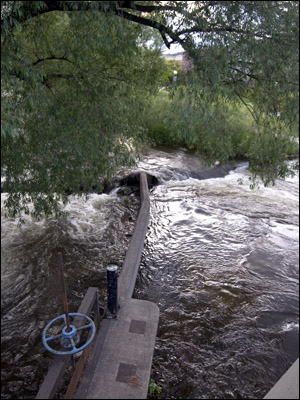April 13, 2011

A report produced by Colorado State University’s Colorado Water Institute recommends several strategies to balance agricultural, urban and environmental uses for the West’s water resources.
Agricultural/Urban/Environmental Water Sharing: Innovative Strategies for the Colorado River Basin and the West explores ways to allow water transfers from agricultural to urban uses while avoiding or mitigating damages to agriculture and the environment.
Strategies detailed in the report include:
- Farmers and cities in Arizona trading use of surface water and groundwater
- Ranchers in Oregon paid by environmentalists to forego a third cutting of hay to accommodate late summer fish flows
- A ditch company in New Mexico willing to sell shares of water to New Mexico Audubon for bird habitat on the same terms offered to a new farmer to grow cantaloupe
- A California flood control and water supply project managed to restore groundwater, maintain instream flows for wild salmon and steelhead, and provide water for cities and farms
- Seven ditch companies cooperating in Colorado in a “super ditch” scheme to pool part of their water through rotational fallowing, for lease to cities, while maintaining agricultural ownership of the water rights
Recommendations offered in the report include:
- Design processes that give environmental, urban and environmental stakeholders opportunities to plan together early in the process
- Foster a flexible, watershed-based approach that can lead to cross-jurisdictional sharing of infrastructure, cooperatively timed water deliveries, and strategies to facilitate real-time water management for the benefit of cities, farms and the environment.
- Break down legal, institutional and other obstacles to water-sharing strategies by developing criteria and thresholds that protect agriculture, the environment and any third parties to water-sharing transactions.
- Experiment with approaches such as “water resource sharing zones” and the trading of water, financial resources and locally grown food while encouraging interaction between agricultural, environmental and urban neighbors.
- Expedite the permitting process when programs or projects have the support of agricultural, urban and environmental sectors.
- A governor-championed federal/state pilot review process should be established where a state liaison and a federal designate are appointed to facilitate concurrent agency review and permitting without repetitive information exchanges.
The report is under consideration by the Western States Water Council, the water policy arm of 18 western governors. It included input from The Nature Conservancy, Family Farm Alliance, Western Urban Water Coalition and other groups. The full report may be viewed at CSU’s Ag/Urban/Environmental Water Sharing web page.
In coming months, group members will meet with environmental, agricultural and urban groups throughout the Colorado River Basin and the West to encourage discussion.